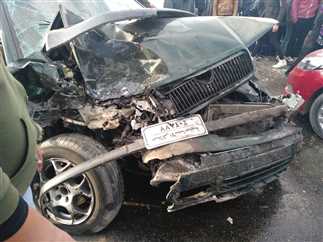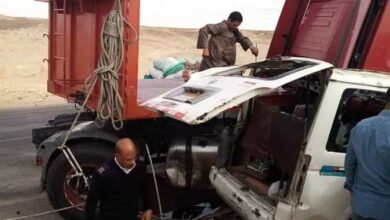“I said the backseat takes only three passengers. If you don't like it, get off the bus.”
“Come on, driver, there's enough space for four. It's rush hour, and we have errands to run.”
“I repeat — three. If you don't like it, get off and find another bus. There are plenty.”
This is a conversation that takes place every day between passengers and drivers of one of the most important means for transportation in Egypt: the microbus, also known as “mashrou’” (project). Though expensive when compared to other modes of transportation (such as the government-owned public buses), the microbus is indispensable for many residents of Cairo and other provinces.
Strangely enough, microbus drivers have become a social phenomenon themselves. They believe state laws are unfeasible and inapplicable, and therefore create their own interpretation of the law to suit their interests, using a mafia-style logic.
Mohamed Ibrahim, a 42-year-old government employee, has been using the microbus for 15 years. “I cannot stand drivers’ opportunist and provocative behaviors anymore. There are no clear standards determining the fares, and the way they drive makes me nervous. They drive so fast and mistreat other motorists on the road,” he says.
According to Ibrahim, there is no clear oversight by authorities on microbus operation, especially the fare issue. On other means of transport, such as the metro and public buses, fares are set by the government.
However, Ibrahim stresses that microbuses are still a good option as they reach all areas of the city and are free of restrictions regarding specified stops or working hours, unlike other means of transportation.
Microbus drivers explain that their freedom is largely the result of the fact that they are the owners of their cars. They say they are not subject to restrictions by any state body other than the Interior Ministry’s General Traffic Administration. Remarkably, these drivers don't mind committing traffic violations as long as it enables them to continue packing their cars with passengers throughout the day.
“I admit surpassing the maximum driving speed specified by authorities [100km per hour],” says Waleed Abdu, 48, a microbus driver working on the Cairo-Alexandria desert road. “Often I go over 140km per hour, but it is for the passengers’ good. If someone wants to leave Alexandria at 8 am hoping to finish his business in Cairo before the afternoon, it’s common sense that he will take the microbus because it takes only two hours on the road, unlike the train, which takes three.”
Abdu believes that his 12 years of experience as driver on the Cairo-Alexandria Road enables him to easily identify the locations of speed radars, making it unlikely that he will be caught speeding or breaking other traffic laws.
Most drivers refuse to set a stable fare. Transportations tariffs agreed upon by drivers and authorities are not implemented. Drivers say that because they are the ones who do maintenance and repair on the vehicles, they should not have to pay fees to the government.
Microbuses are supposed to be bound to operating in certain areas, determined by their respective traffic departments, but it is common to see microbuses with Fayoum or Qalyubiya license plates working in Cairo and Giza or buses from Beheira driving through Alexandria.
Such breaches take place with the knowledge of the traffic administration, whose willingness to turn a blind eye stirs suspicions about the nature of relations between drivers and traffic employees. Ahmed Abdel Moneim, a microbus driver, told Egypt Independent that he bribes police officers to overlook his violations.
“There are many traffic officers who you must bribe, and many drivers do it. But that comes at the expense of passengers, as I then have to raise fares to make up for the bribes I pay.”
In the past few years, several drivers have been tortured or killed by police agents for refusing to agree to their financial or other demands. One memorable example is the case of Emad al-Kabeer, whose torture at the hands of police officers was captured on video and circulated widely on the internet.
There is not an easy solution to the problems surrounding microbus operation, particularly relations between drivers and the authorities. Earlier incidents have shown that police officers and drivers are equally corrupt. Meanwhile, the security leaders’ role in countering the problem has been limited to increasing the financial value of contraventions, though; such a measure drives up bribes on the other hand.




